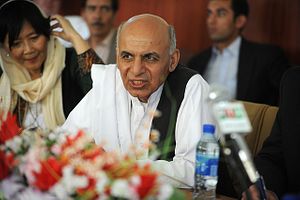The sixth Regional Economic Cooperation Conference on Afghanistan was held in Kabul last week. The purpose of this two-day summit was to examine the challenges of rebuilding Afghanistan after years of conflict. Even with representatives from 30 countries and 40 international organizations in attendance, India was conspicuous by its rather low-profile representation. Instead of a ministerial presence, New Delhi decided to send a junior bureaucrat to the conference.
Though India’s ambassador to Afghanistan has rejected suggestions that New Delhi is heading for a strategic shift in relations with Kabul, India’s decision not to revive the Strategic Partnership Agreement signed in 2011 is being viewed as a sign of New Delhi’s displeasure over the Afghan unity government’s outreach to Pakistan at the cost of Indian interests.
This shift comes at a time when regional realities in South Asia are becoming stranger by the day. Pakistan continues to insist that it is still ready to facilitate the revival of stalled peace talks between the Afghan government and the Taliban. Pakistani National Security Advisor Sartaj Aziz met with Afghan President Ashraf Ghani last week to “restore trust and confidence between the two countries,” but it is unlikely to placate the growing anti-Pakistan sentiment in Afghanistan.
Meanwhile, tensions are rising between Afghanistan and Pakistan with the latter even summoning the former’s envoy regarding Kabul’s blaming of Pakistan for a recent wave of violence. The activities of the Taliban have continued along the southern and northern borders of the country, including through bomb attacks in the city of Kandahar, which climaxed in a huge bomb blast that devastated state buildings in the capital, and killed scores of people in an unprecedented manner last month. Just hours after a suicide attack killed five people at Kabul’s international airport last month, Afghan President Ashraf Ghani blamed Pakistan for the violence that swept Afghanistan, leaving scores dead in a matter of days. Ghani remarked that Kabul “hoped for peace, but war is declared against us from Pakistani territory,” underlining that “the incidents of the past two months in general, and the recent days in particular, show that the suicide training camps and the bomb-making facilities used to target and murder our innocent people still operate, as in the past, in Pakistan.”
This was significant departure from a supposedly pro-Pakistan Afghan leader we’d seen some months ago. The office of Afghanistan’s chief executive officer, Abdullah Abdullah, has also warned Pakistan to handle terrorist sanctuaries in its territory, saying that if it doesn’t do so, Afghanistan will. A high-powered Afghan delegation also visited Pakistan to demand Pakistani action against Taliban forces using Pakistan as a safe haven to direct recent attacks in Afghanistan. Their demands included the arrest and expulsion of Taliban leaders from Pakistan, as well as the cessation of the treatment of Taliban forces in Pakistani hospitals.
U.S. National Security Adviser Susan Rice was also in Pakistan recently, where she not only extended an invitation to the Pakistani Prime Minister to visit Washington but also made it clear that the militant attacks from Pakistan into Afghanistan were “absolutely unacceptable.” She additionally called for a crackdown on militant groups, including the Haqqani Network. The United States has told Pakistan that it will not certify to Congress that Pakistan’s counterterrorism operations in North Waziristan have damaged the Haqqani Network, thereby blocking the disbursement of the next tranche of military financial assistance from the Coalition Support Fund.
Meanwhile, the announcement of former Taliban leader Mullah Mohammed Omar’s death has thrown the organization’s leadership into turmoil and led to open feuding among its senior management. Scores of Taliban fighters have been killed in clashes over the appointment of Mullah Akhtar Mohammad Mansour as the successor of the Taliban’s founding leader, Mullah Omar. His appointment angered Mullah Omar’s family and many senior members of the Quetta Shura. And now the new Taliban leader has reportedly deployed hundreds of fighters to Zabul Province to fight forces loyal to Mullah Mansour Dadullah, who has publicly refused to pledge allegiance to Mansour.
The silence over Mullah Omar’s death for years and now its inability to control the shenanigans within the Taliban has once again exposed the hollowness of Pakistani claims of being an honest broker in bringing the Taliban and the Afghan government together. As Ghani’s disillusion with Pakistan sets in, New Delhi is probably making it clear that while it has equities to preserve in Afghanistan, it is in no particular hurry to come to Ghani’s rescue. The Modi government is different from its predecessors in that it seems more than willing to play hard ball with its foreign policy. If Ghani has been lukewarm to India so far, the Modi government too seems to have decided that it will now take its own time to warm up to the new Ghani, who seems to be belatedly counting the costs of his Pakistan tilt.
































